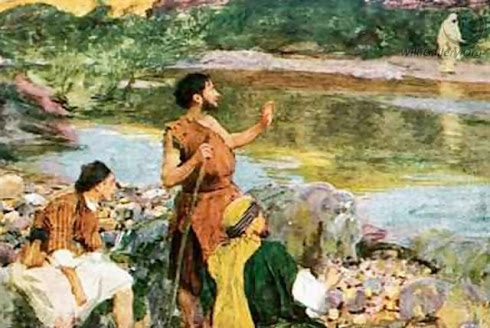Who are we?
This is the first in a series of reflections regarding marriage and family life. My name is Father David Carrano and I am a newly ordained priest in the Diocese of Madison. I have just finished studying for a year on this topic at the John Paul II Institute for Marriage and the Family at the Lateran University in Rome. The purpose of these reflections is twofold: one, to provide myself a way to synthesize what I am learning about this subject, and, two, to impart a bit of what I am learning to those who the subject impacts the most: married couples and families. I hope that these reflections may lead you closer to Christ, closer to your spouse, and may unite your families. I also hope that we may begin a dialogue on this topic which is so central to the health of our society and of individuals.
Beginning a reflection on marriage and family, we are immediately aware of how broad the topic is. We must speak of the ideal yet not ignore what is real, what is the existing state of marriage in the United States today. More fundamentally, however, we must ask what the human being’s view of himself is in our time, for his understanding of his identity will eventually be reflected in the most basic structuring of society. This basic structure has always been the family. Today, however, we may be seeing the first fruits of a new era. The basic structure of society has become, one could argue, the individual. This is the result of many years of a changing intellectual landscape. This forces us, in a sense, to begin with the question: “Who am I?” before we may ask “Who are we?” I would like to propose two simple starting points to answering this most fundamental question: one philosophical (arrived at by reason alone) and one theological (arrived at with the help of divine revelation).
We may be tempted to begin answering the question “Who am I?” by retreating into ourselves. Yet is it even possible to do so? Can I define myself without reference to anything outside of myself? Do I not begin by saying: “I am the son of…” “I was born in…” “I studied at…” etc.? The attempt to define myself outside of relationships with other people and things leads only to the temptation to say: “I do not know who I am.” Yet perhaps this does reveal something about who we are as human beings. If I cannot truly understand myself without looking outside of myself, then I know that my very being is one which is dependent upon relations. I am not just myself, but I am the one who exists in a certain time and space, in relation to all that is around me. I am a being-in-relation. I must discover who I am by understanding my relation with other things. More importantly I must understand my relation with other persons who also know themselves to be an “I,” for that is what sets us apart from all other beings that we experience in the material world.
The Bible begins with a revelation that leads to similar conclusions. In the Book of Genesis we read that human beings are, indeed, beings-in-relation. The first relation is one with God, who creates man. Not only that, He creates man “in His own image.” There is something in man which places him in a relationship with his Creator, something which makes him like God and so also (and perhaps surprisingly) able to interact with Him. The second fundamental relation is that between human beings, or more specifically, between man and woman: “Male and female He created them.”
Hence the question we began with: “Who am I?” immediately leads to the question “Who are we?” They are inseparable. The first cannot be answered without the second, and vice-versa. Do we not see a crisis in our society in BOTH aspects? Should this surprise us? If we are building a “society of individuals,” if “we” is defined by our individually standing alongside one another rather than our true relationships to each other, it is no surprise that we struggle to know our true identity as individuals.
Marriage and the family are two places where we can begin to truly live as we were meant to: not just as individuals side-by-side, but as two becoming one flesh, and as communities of love. We may be acutely aware, through experience perhaps, that models of marriage and family based upon individuals standing alongside one another cannot survive. Rather, the health of marriage and family depends upon a true communion between persons. May God help us in this task, for He is truly the origin of all that is good.
Yours in Christ,
Rev. David Carrano
(First written October, 2009)
